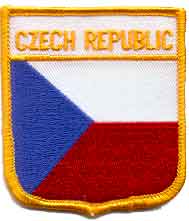

| Czech Republic |
|
|
|
Telc, Czech Republic - July 2000
The Reverend Doctor James Wiberg
Friday one of my Christ
Care Group leaders called to invite us to join them for the day on a
trip to the Czech Republic. Since the calendar had no appointments for
the day Luray and I During the days of the Iron Curtain, the Communists had established a "no-man's land" on their side of this curvy river. At our crossing there was one only two border guards to check our passports on the Austrian side and two on the Czech side, a pretty "cushy" job I would say, since there were only a couple of cars traveling this route when we went through. The normal crossing on the way to Prague will sometimes back up a line of traffic about three miles long, especially when bargain hunters from Vienna head out for the weekend in the Czech Republic..
As we approached the town we entered from a
road which brought us right to the After w Al and Sue Liebetrau our
hosts had checked out the area before coming and had also talked with
friends at the UN about the attractions of this city.
Crystal and glass are particular items sold here at very
reasonable prices. Minerals and antiques are a close second and then the
normal kitsch---clothes, electronics, trinkets, carpets, etc.
Since the city has become somewhat of a tourist attraction
there were crowds of people in every shop.
Performing in the middle of the square was a native Czech Dance
Group tantalizing the audience with the swift movement of their feet and
the lively music of a little combo.. After about an hour and the completion of the ascent to the
bell tower, we set out on a stroll around the city wall to a marvelous
park filled with flowers of every color.
As we strolled, the babble of different languages continues to
confuse me and I am still no better at distinguishing Czech from Turkish
or Slovakian from Hungarian even after almost a year here in the central
part of Europe. However, I am starting to understand a bit more of this
German I listen to all of the time in the street and on the subway. Having rested our muscles
and refurbished our bellies with good old Vienna city water which we had
brought along in old soda bottles, we decided to take a cut-off trail
through the ruins of an old building.
The trail led to a path along the river, but here we encountered
a tent village with many, many campers, mostly young people, but some
couples with children as well. As I gazed upon the city
across the river from the park and campground, I had no trouble
imagining the cold war era. Along
the Thaya River to the south of this city, on a high promontory on the
Austria side would be another scenic overlook.
Now both of these are overlooks are equipped with roofs and
benches, so looking back a few years I can see in my mind's eye the
Austrians and Czechs surveying each other with binoculars and probably
wishing that this foolish wall would come down so that they could go
talk to their neighbors again. And now, in 2000 the wall
is down; the fences have been removed; a bridge has been After enjoying the view
of Telsch from the park across the river we headed for that dessert menu
at a little Cafe on the border and ordered up our Cappuccinos, ice
coffees, and coffee mélanges', this time from a pleasant dining room in
a brand new facility. The skies were now clear
as setting sun ushered in the stillness of its evening repose. A few
tired pilgrims from another world could review again the strange events
and twists and turns that have brought us to another section of the
globe. Our short little momen Soon our day in the
country was at an end. Sue and Al dropped us off at a subway entrance
near their house and we headed back to the apartment where I could
continue to wrestle with the text for Sunday's sermon. THINK GLOBALLY- ACT LOCALLY - PRAY FOR WORLD PEACE |